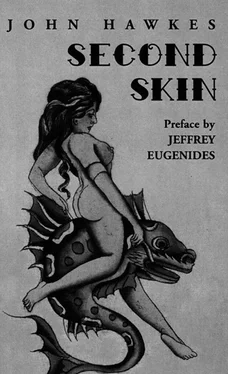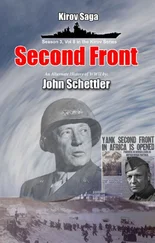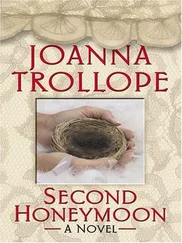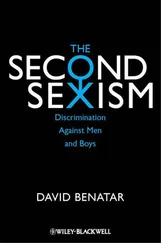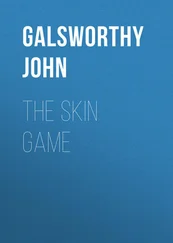The neat pile of clothing was fluttering a little in the moonlight and it was damp to the touch. I could not make myself look down. But I felt that I had seen her already and there was no reason to look down again. So I half-sat, half-lay there in the cold, the moonlight, the wind, stretched myself out amidst the broken glass and debris and thought about Cassandra and was unable to distinguish between her small white oval face — it was up there with me as well as below on the black rocks — and the small white plastic face of the BVM.
“I won’t ask why, Cassandra. Something must have spoken to you, something must have happened. But I don’t want to know, Cassandra. So I won’t ask….”
I clutched a couple of the thin rusted stanchions and in the gray moonlight stared out to sea. The shoals were miles long and black and sharp, long serrated tentacles that began at the base of the promontory and radiated out to sea, mile after square mile of intricate useless channels and breaking waves and sharp-backed lacerating shoals and spiny reefs. Mile after square mile of ocean cemetery that wasn’t even true to its dead but kept flushing itself out on the flood tide. No wonder the poor devils wanted a lighthouse here. No wonder.
I turned again, crept back from the edge and started down. I had climbed to the top of the lighthouse and I was able to climb back down again, feet first. It was a matter of holding tight and feeling my way with my feet and dropping down with little terrible free falls through that tower of darkness. But I managed it. I reached the bottom after all, and I sat on a concrete block in the empty doorway with my head in my hands. I sat there with the lighthouse on my shoulders. And somewhere the tide was rising, the moon was going down, the clouds were scudding. And I sat there while the damp grass sang at my feet and the white tower listed in the indifferent wind.
Ducks in June. Baby ducks in June. I could hear them, Miranda’s brood of little three-day-old cheese-colored ducklings, hear them waddling behind the house on this bright early dawn in the first week in June, hear them talking to each other and doing their little Hitler march step as I stood by the bright black stove and coaxed the coffee to reach its rich dark aromatic climax so I could sit down to an early breakfast with Pixie. It was a chilly dawn, but outside the sun was out, and inside Miranda’s kitchen the wood-burning stove was as rosy as a hot brick.
“Hear the ducklings, Pixie? You like the little ducklings, don’t you, Pixie?”
She looked up at me from where she sat on the wide soft boards of the wooden floor — bright pudding face, bright platinum hair, on her finger a little tin ring that I had found in a Cracker Jack box — and opened her mouth for me and kicked her little dirty white calfskin shoes and gave the rolling pin a quick push. I smiled. Pixie always enjoyed the game with the rolling pin.
“Shall we go out and play with the ducklings after breakfast, Pixie? Would you like that?”
Fresh white apron, fresh white shirt, fresh creamy taste of the toothpaste in my mouth, and Miranda’s old tin clock said that it was six o’clock in the morning and already I had ground the coffee in the coffee grinder and put the cereal bowls on the table and finished off Pixie’s cold orange juice. And now the sun was shooting golden arrows through the blistered glass in the kitchen window and the stove was warm. The coffee smelled like the new day and was beginning to bubble up into the little myopic eye of the old percolator.
“Where’s the corn flakes, Pixie? Go find the corn flakes….”
Big square whitewashed kitchen, sharp golden arrows of the new sun quivering on the white walls and on the table set for two, old tin clock pattering and twisting and clicking in the throes of the hour, little ducks marching around and around outside and the light frost was beginning to disappear. I dangled a quilted pot holder from my fingers and tended the stove and glanced every once in a while at the waiting table. Because instead of the usual unopened fifth of Old Grand-Dad on the breakfast table for Miranda, there was a package wrapped in white tissue paper and done up in red, white and blue ribbons and so placed on the table that it could have been meant only for me.
“What do you think is in the package, Pixie? Something for Grandpa? A present for your grandfather, eh, Pixie? Shall we open it after breakfast and then go play with the ducks?”
There was a card tucked under the ribbon and I had already allowed myself a look at the card— For Skip— in a bold black handwriting, nothing more — while Pixie was busy with the rolling pin I had slipped it out of the envelope and read it and then put it back where I had found it in such a way that not even Miranda could tell the difference. A quick look at the card was one thing, but the present itself, I knew, would have to wait. Perhaps I could even hold off until I had done the dishes though I suspected not.
Corn flakes and cold milk and the bowl of sugar. And then the usual fight with Pixie until I made her drop the rolling pin and was able to pick her up and strap her into the pink enamel chair and give her the jam jar and little silver spoon to play with. And then the coffee. The heat of the spicy beans. The first heat of the day. Better than bacon. But just as I was pouring the coffee and sniffing it and watching the sensual brown metamorphosis in my thin cup, just as I was smiling and getting ready to sit down to breakfast with Pixie, I smelled the sudden odor of a lighted cigarette and felt a movement at the door. I waited and then raised my eyes.
“Miranda,” I said. “Good morning! Have some coffee?”
At six-fifteen in the morning she was standing in the doorway with her long legs crossed and her shoulder leaning against the jamb. Black eyes and sockets, uncombed hair, white face. And after all these months she was wearing the canary yellow slacks again.
“Come on,” I said, “have some coffee. First pot’s the best, isn’t it, Miranda?”
She puffed on her cigarette, exhaled, shook her head.
“Well, Miranda,” and I was stooping, still holding the pot, smiling up at her, “there seems to be some sort of present on the table. We don’t have so many presents around here, do we?”
And then: “That one’s got your name on it, Skip.”
“Really?” I said. “Well, come on, Miranda, tell me. What is it?”
And slowly and keeping the big formless black eyes on mine and sucking the gray smoke back into her nostrils: “Fetus,” she said, and the big mouth slid down a little as if it might smile.
I turned, set the coffee pot on the edge of the stove, faced her again, took hold of the back of the chair with both my hands. The arrows were quivering on the walls but she was watching me.
“What did you say, Miranda?”
“Fetus. Two-months-old fetus in a fruit jar, Skip.”
I pulled out the chair then, slowly, and sat down. I pushed away the corn flakes, folded my hands. Miranda was smoking more quickly now, was taking deep rapid puffs. And she was wheezing now. There was a little grease on her face but no lipstick, powder, rouge. Only the uncombed hair and spreading black stains of the eyes.
“I don’t understand you,” I said at last, watching her, smelling the smoke, noticing that under the blouse she was naked. “I really don’t know what you mean, Miranda. What kind of fetus?”
“Just a fetus, Skip. Two months old. Human.”
Pixie, I saw, was holding the jam jar on its side and had given up the spoon and had thrust her little hand into the neck of the jar. Strawberry jam. Coffee fast cooling off. Baby ducks still marching. And the white tissue and the card and the ribbon. Red, white and blue ribbon. And I wondered, asked myself, if it could possibly be true. How could it possibly be true? Wasn’t it only Miranda’s whim? Knowing full well that I would never open it, wasn’t it only Miranda’s cruelest way of tormenting me at six-fifteen on a morning in the first week in June? But why? What was she trying to tell me? And then suddenly I knew the first thing I had to do, and I did it. I simply reached out my hand, picked up the package, put it to my ear and shook it. But there was no sound. And I could tell nothing by the weight. It was a fruit jar, just as she said, but whether it contained anything or was empty, I did not know.
Читать дальше
